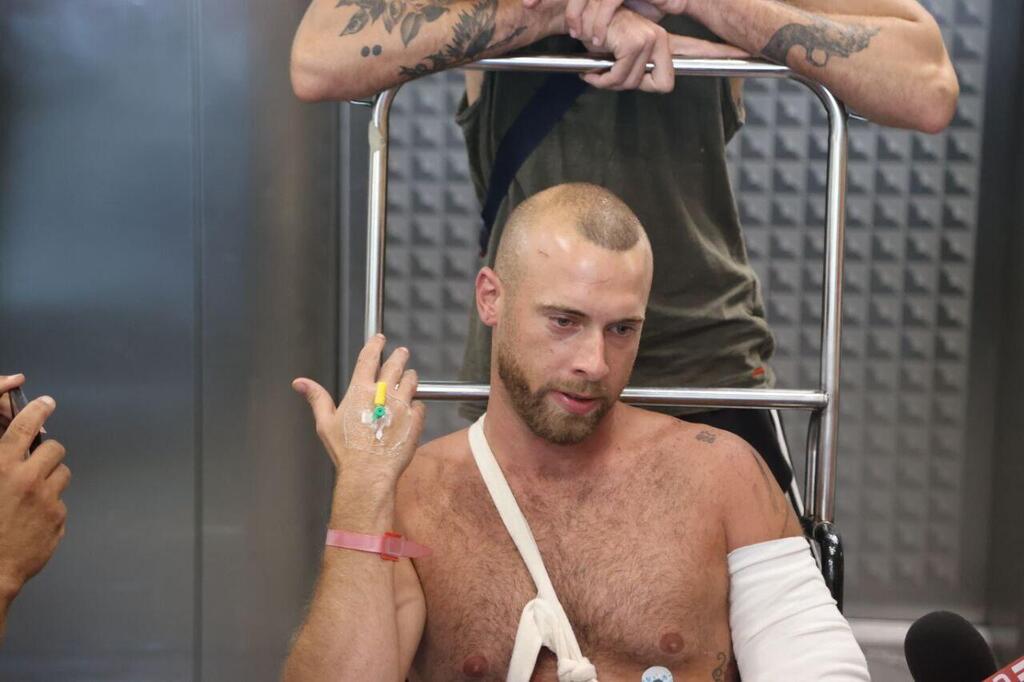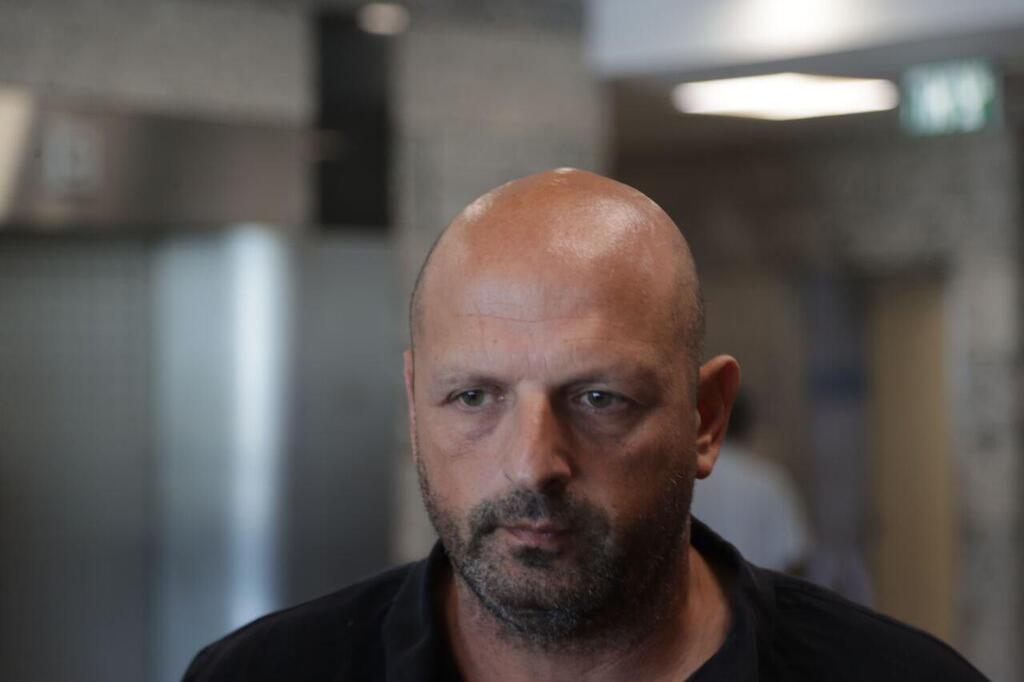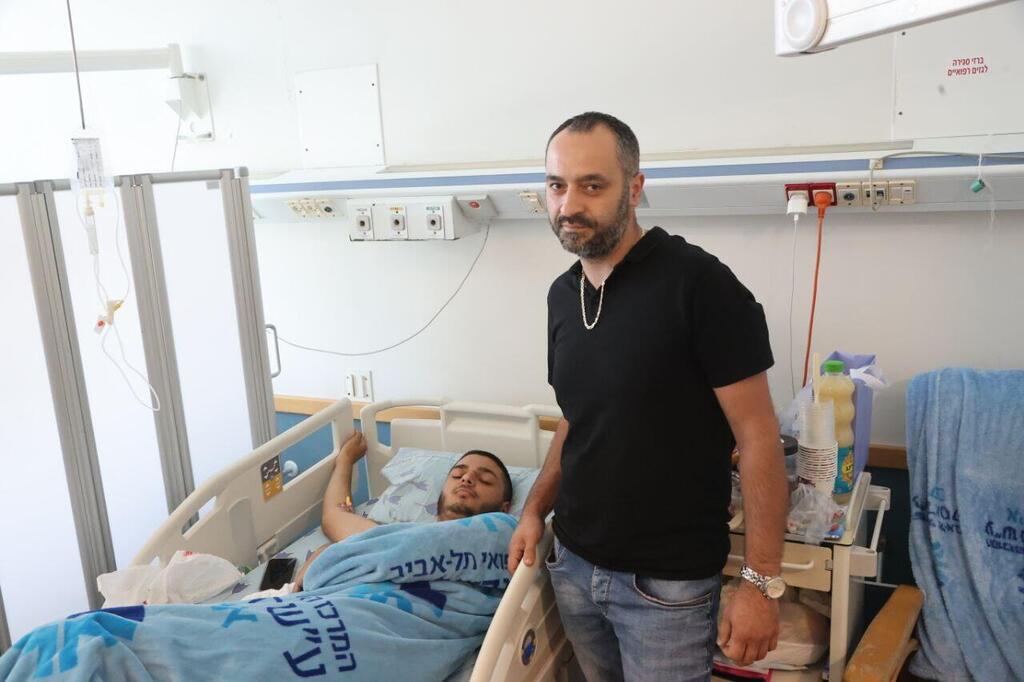In the two weeks since the Hamas terror attack on the Gaza border communities the world has heard numerous accounts of sorrow and bravery, as well as disappointing stories pointing to a serious failure by the military. Parents of Israel Defense Forces soldiers and participants in the Nova music festival at Kibbutz Re'im who were hospitalized at Sourasky Medical Center in Tel Aviv told Ynet that their sons were deployed without adequate equipment, engaging in combat with only small firearms against terrorists armed with grenades. They also recount distressing incidents of unanswered calls for assistance that went unanswered for hours.
Read more:
Additionally, we heard the emotional testimony of Sahar Ben-Sela, 30, from Herzliya, who painfully described a festive gathering that tragically transformed into a horrific massacre."They mercilessly killed us from close range. They behaved like inhuman creatures, shooting and deriving pleasure from it, with smiles on their faces," he said.
Ben-Sela, who sustained moderate injuries during the music festival, was among the hundreds of individuals who desperately attempted to flee for their lives as the horrifying terrorist attack unfolded. "I arrived at the party around 3:00 a.m., when it featured DJs from various parts of the world. It was an international event with approximately 3,000 participants.
"As we were heading toward the tent to locate a friend, rockets suddenly came flying toward us at close range. The music stopped, and we heard alarms. In an instant, a terrorist attack unfolded before our eyes. We hurriedly got into a car and tried to escape amid utter chaos. People were driving at speeds of 120 kilometers per hour while being targeted by live fire. We witnessed the terrorists in their vans."
"They opened fire on us, threw a grenade, and after a minute, when everyone was screaming in sheer panic, another grenade flew over me and grazed my head. I saw lifeless bodies behind me, bearing the marks of shrapnel. My friend was shot at close range. Those in the first and second rows - they were mercilessly killed. I suffered a bullet wound in my elbow and shrapnel wounds in my leg and ribs," Ben-Sela recalled while breaking down in tears.
"Fortunately, at that particular moment, the terrorist's weapon jammed, and he left the scene. I frantically searched the ground for any available weapons, but the shooting resumed. I climbed onto an abandoned police car, turned on the ignition, and called for help. They instructed me to run. I tried to start the car, but my attempts were unsuccessful, while my friend attempted to administer CPR to his comrade. The terrorists shouted, 'She's dead.' They are savages, killers with a malevolent glint in their eyes. They brutally slaughtered us from close range. They shot us and reveled in their sadistic pleasure, with smiles on their faces."
The process of evacuating from the scene, which had turned into a near-mass grave, also lasted for several hours. "I was taken to an ambulance that was already filled with wounded people. They brought in parents with a child who had sustained injuries all over their body, as well as an elderly man who was on the brink of death beside me, yet I was unable to provide any assistance. Three hours went by, it was chaos."
Dolev caught grenade shrapnel, his friend died
Tel Aviv's Sourasky Medical Center provided 60 individuals with treatment for their injuries in the first day after the attack, with nine arriving in critical condition and six requiring ventilators. Among the hospitalized patients, approximately 30 were soldiers, including Dolev, a soldier from the Egoz Special Unit hailing from Kibbutz Gadot, who sustained moderate injuries.
Dolev's father expressed his concerns. "They were deployed from Mount Dov to Huwara and, on Saturday morning, to the southern area without proper equipment. They were armed only with light weapons while facing terrorists armed with grenades. In the midst of a face-to-face confrontation, shrapnel from a grenade struck Dolev, resulting in the tragic loss of his friend's life."
Dolev, who was expected to be discharged within a month, had received a sudden call to join the battle in the southern region. "After having a fragment removed from his hip, he was admitted to the orthopedic ward. He was fortunate, not just on a personal level, but from a national perspective. It is crucial for us to draw lessons from this war and adapt to the altered dynamics of the conflict. We must be prepared to fight and emerge victorious," according to his father.
Idan's parents looked for him in every hospital bed
Phoebe Nachmias, the mother of Yaron, 52, a resident of Netivot, was unaware of the specifics surrounding her son's near-fatal injuries. Yaron's child was staying with his ex-wife in Kfar Aza when news of the terrorist infiltration reached him. Without hesitation, he rushed to assist in fighting them back. Yaron was swiftly transported to Barzilai Medical Center in Ashkelon, where he underwent surgery before being transferred to Sourasky sedated and on a ventilator. Nachmias was just grateful that he was alive. "Thank God I can see him," she said.
Idan, a 19-year-old who sustained moderate injuries at the Gaza border, was initially rushed to a hospital in Be'er Sheva. The night before, he had spoken to his parents, assuring them that "everything was calm." However, upon hearing about the infiltration of terrorists in the morning, his parents were filled with fear. "They called to inform us that he was in Be'er Sheva. We drove there in a state of panic. The scene was chaotic like nothing I had ever witnessed," according to his father, Sasson.
"No one seemed to know who had arrived, their condition, or where they had been transferred" in the hours after the attack, recounts Sasson, an employee at Sourasky Medical Center. "We had no choice but to move from one bed to another, from one ward to another, until my wife finally found him. We were informed that a doctor had not yet seen him, and it became clear that it would be hours before that happened. That's when I requested permission from the Chief Medical Officer to evacuate him in my private car."
A mother of an IDF soldier: 'He waited 6 hours for evacuation'
Ira, a resident of Metula and the mother of an IDF soldier who was admitted to intensive care at Sourasky Medical Center after the attack, learned about her son's ordeal from his friends. "He went through hell, bleeding for six hours with an exposed fracture until he was finally evacuated. No one came to their aid. Where was the Air Force?" said his mother.
On Saturday morning at 6:00, she woke up and noticed there were being rockets fired on the southern region. She thought to herself, "It's just the usual, nothing new." She sent a message to her son, Yuval, but received no response. Assuming that there was no reception, as often happens, she decided to take a walk by the river. Then, at 1:02 p.m., she received a recorded message from Yuval saying, "Mom, you are the most important person to me in the world."
Ira was taken aback and dropped her phone, feeling unprepared for such a message. Yuval was not someone who openly expressed his emotions, so she knew that if he wrote something like that, something terrible must have happened. Soon after, an unfamiliar person called and informed her that Yuval had sustained minor injuries. Ira refused to believe it, as she knew that her son was either completely unharmed or severely injured. There was no in-between with him.
"I accompanied his father on the journey to Sourasky and, during the drive, the surgeon called to inform me that Yuval was undergoing emergency surgery. I insisted on seeing him before, uncertain of what the outcome would be. As time went on, I discovered that he had been under fire for a grueling six hours, positioned just 20 meters from the border fence," according to his mother.
"Despite being barraged by missiles, they managed to enter an armored personnel carrier (APC). Desperate for assistance, they called for help, yet the air force did not arrive. Yuval witnessed the terrorists breaching the fence and seizing their APC. He endured six hours of bleeding with an exposed fracture until he was eventually evacuated. The doctor later revealed that had it not been for the tourniquet, Yuval's survival would have been unlikely," she said.




